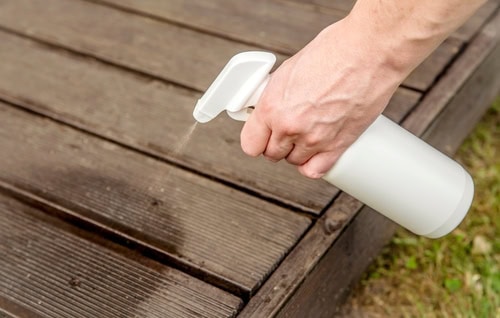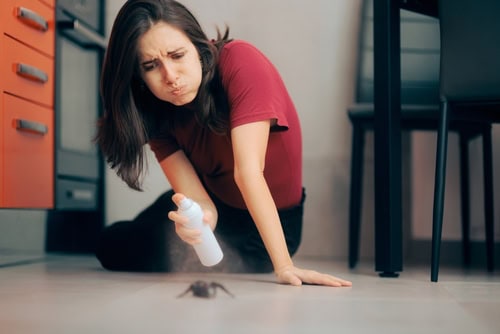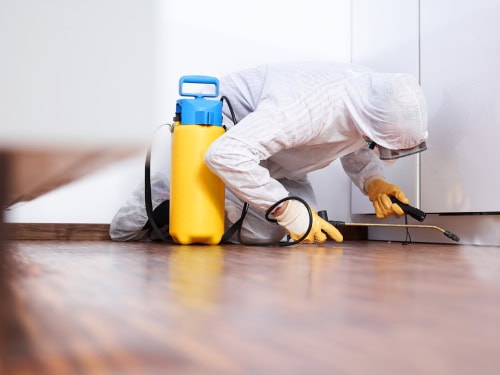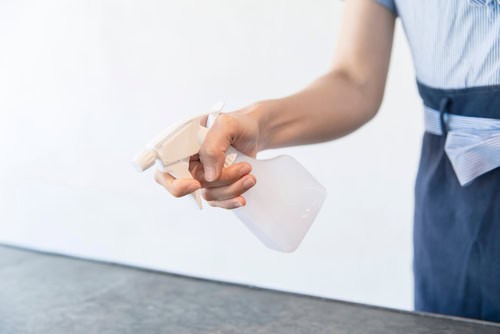
Will Disinfectant Kill Plants?
July 28, 2022
How To Clean And Disinfect Gyms?
August 11, 2022Can Disinfectant Spray Kill Bugs?

Can Disinfectant Spray Kill Bugs? A home with a pesky pest can be a frustrating place to live. With bugs coming through the walls, emerging from the kitchen sink, and waiting in your bedroom closet for you to walk by, it can be hard to keep up with all that needs to be done to get rid of them. However, there is hope.
With a well-stocked arsenal of pesticides and disinfectants, you can get rid of those unwanted pests once and for all.
When faced with an infestation, the first thing to do is approach the problem logically. Try to figure out what sort of pests are making their home in your home, and figure out a way to get rid of them. One thing that comes to your mind is to use a pesticide or a disinfectant to get rid of the pests. Now, the question is; Can disinfection spray kill bugs?
Can Disinfection Spray Kill Bugs?

Disinfectants, like pesticides, come in many different varieties with different ingredients. Some of these ingredients are very effective in killing pests and insects. To be certain that a particular disinfectant will be effective in killing bugs, check on the following:
- The ingredients in the disinfectant
- The type of bug you are trying to kill
- How is the disinfectant being used
The ingredients in the disinfectant
The first thing to look for in a pest spray is either a pesticide or an ingredient designed to kill bugs and pests. When searching for a disinfectant that can kill bugs, look for ingredients like pyrethrin, permethrin, or resmethrin. Pyrethrin is a natural insecticide that comes from chrysanthemum flowers.
Permethrin is a synthetic pesticide that is similar to pyrethrin. Resmethrin is another synthetic pesticide that is often used in mosquito repellents. All three of these ingredients are designed to kill insects on contact.
The second thing to look for is that the ingredients are safe for use around humans and animals. Some pesticides can be quite harmful if inhaled or ingested. Make sure that the product you are using is designed to be safe for use around people and pets.
The type of bug you are trying to kill
Different types of insects will require different types of pesticides. For example, if you are trying to kill ants, you will need a different type of pesticide than trying to kill cockroaches. Ensure that the product you are using is designed to kill the type of bug infesting your home.
Usually, the packaging will specify what type of bug the product is meant to kill. With so many different types of bugs, there are also many different types of pesticides. It is important to find the right one for your needs to be effective.
How the disinfectant is being used
For a pesticide or disinfectant to be effective, you must use it correctly. Follow the instructions on the packaging to ensure that you are using the product correctly. Some products will need to be sprayed directly on the bug, while others will need to be used as a fogger or bomb.
The most important thing to remember is to be thorough in your application. Make sure to get into all the cracks and crevices where bugs like to hide. Once you have treated your home, vacuum and clean regularly to keep the bugs from returning.
Why Doesn’t The Product Work?

There are a few reasons why your bug spray might not be working.
- You purchased the wrong type of product
- The product wasn’t used correctly
- The infestation is too severe
- The bugs are resistant to the pesticide
- Other factors are attracting the bugs
You purchased the wrong type of product.
Many different types of pesticides and disinfectants are manufactured for specific target pests. For example, some products are made to kill roaches but will not affect bedbugs. Picking the right product type is essential to eliminate the problem.
The product wasn’t used correctly.
For the pesticide to work, it must be used as directed. This means that you must follow the packaging instructions to ensure that you are using the product correctly. If the product isn’t used as directed, it probably won’t be effective in killing the bugs.
The infestation is too severe.
Sometimes, an infestation can be so severe that it is impossible to get rid of with just a pesticide. If you have a severe infestation, you might need to call a professional to help eliminate the problem.
The bugs are resistant to the pesticide.
Over time, some bugs can develop a resistance to pesticides. This means that even if you use the product as directed, it might not be effective in killing the bugs. If you suspect the bugs are resistant to the pesticide, you might need to try a different product.
Other factors are attracting the bugs.
Pests are attracted to certain conditions. For example, roaches are attracted to dirty and cluttered areas. If your home is attractive to pests, you might need to clean and declutter to eliminate the problem. Additionally, you might need to repair any cracks or holes in your home that pests can use to get inside.
What To Do If The Product Doesn’t Work

If you have tried using a pesticide or disinfectant, but it doesn’t seem to be working, there are a few things you can do.
- Try a different type of product
- Call in a professional
- Identify and remove the factors attracting the pests
Try a different type of product.
If your product doesn’t seem to work, you might need to try a different type. Many different types of pesticides and disinfectants are available, so you might need to experiment to find the one that works for your needs.
Call in a professional
When you have a severe infestation, you need to call a professional to help eliminate the problem. Pest control professionals have access to products and methods that aren’t available to the general public, so they might be able to help get rid of the problem.
Identify and remove the factors attracting the pests
Pests are attracted to certain conditions that make them thrive. When you identify the factors that are attracting the pests, you can remove them and make your home less attractive to the pests. This might include cleaning and decluttering, repairing cracks and holes, and removing food sources.
Can Disinfectant Spray Kill Bugs? – Conclusion

Yes, disinfectant spray can kill bugs on contact. However, it is important to note that not all disinfectants are created equal. Some may be more effective against certain types of bugs than others. Always read the label carefully and follow the directions to ensure proper use. Additionally, remember that an infestation can sometimes be too severe to be resolved with just a pesticide.
If the product doesn’t seem to be working, you might need to try a different type of product or call in a professional. Finally, remember that pests are attracted to certain conditions. To prevent future infestations, it is important to identify and remove the factors that are attracting pests.




